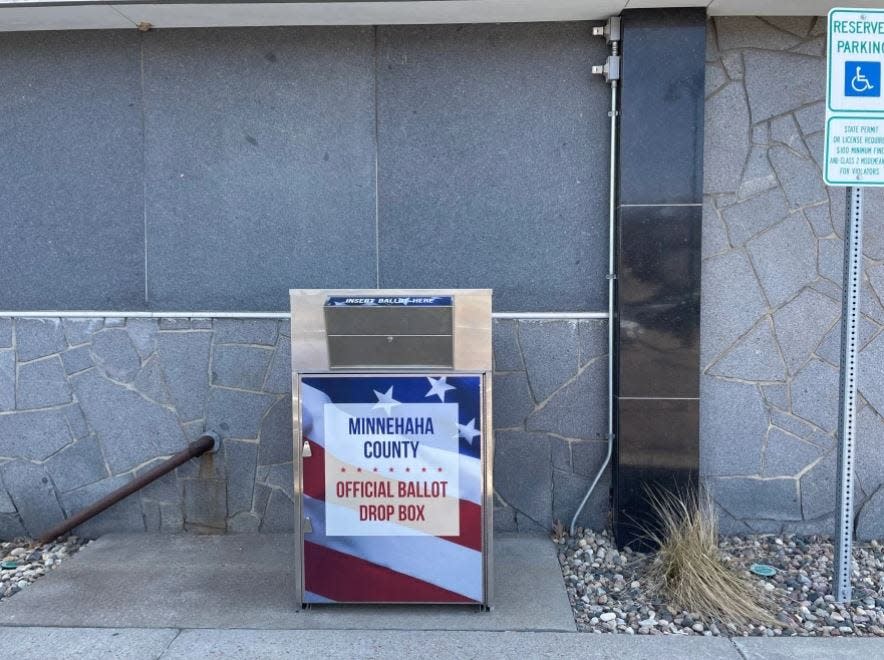Most South Dakota county auditors disagree with election drop box ban
- Oops!Something went wrong.Please try again later.
When the question of using election drop boxes for South Dakota early voting was raised in a House State Affairs committee hearing in Pierre in early February, the discussion took on an ominous tone, mirroring national rhetoric over the integrity of American elections.
“It’s simply too easy for bad actors to abuse these drop-off sites to dump unauthorized ballots illegally,” said Republican Rep. Kirk Chaffee of Whitewood. He was the prime sponsor of House Bill 1165, which modified absentee voting rules and banned the use of unmonitored drop boxes in South Dakota.
More: South Dakota's election system updates could cost millions, Secretary of State says
T.J. Nelson, a lobbyist for Opportunity Solutions Project, a conservative advocacy group that has pushed for restrictions to absentee voting in state legislatures, also issued warnings while working with legislators and county auditors to make it “easier to vote but harder to cheat,” a mantra used by supporters of early-voting reforms.
“Other states have a lot of issues with people just going out and pre-filling these absentee request forms, doing the work for the voter except signing their name, and then dumping ballots,” Nelson testified. “We need to make sure someone isn’t taking a hundred ballots and stuffing them into a ballot box.”
These arguments proved persuasive.

HB 1165 passed both houses and Republican Gov. Kristi Noem signed it on March 21, one of 10 election-related bills that House Majority Leader Will Mortenson said would “keep South Dakota the model for election integrity and voter access.”
But the premise used to outlaw the use of drop boxes – that they are vulnerable to fraud and used to rig electoral outcomes – is false, according to a South Dakota News Watch survey of every county auditor in the state.
Furthermore, most auditors said they oppose the ban because it will make it harder, not easier, for voters to participate in the democratic process.
South Dakota did not record a single case of voter fraud or other election-related crimes tied to the use of ballot drop boxes in 2020 or 2022, according to the survey that drew responses from 58 of 66 counties, including 29 of the top 30 by population.
Of the 58 respondents, 33 (57%) reported using drop boxes as receptacles for absentee ballots in 2020 or 2022 or both, a practice that became more common during the COVID-19 pandemic. Most of the boxes were connected to county buildings and were available to voters during non-business hours, which would not be allowed under the new law.
“I think we’re trying to correct a problem that doesn’t exist,” said Harding County Auditor Kathy Glines, who took office in 1991 and was part of a group of auditors who testified in Pierre.
More: South Dakota county auditors say election process is safe and accurate
“The legislators we worked with were very open and receptive to input we had. But there was also outlying pressure to correct issues that we haven’t had problems with.”
That pressure has been felt by election officials across the country, spurred by former President Donald Trump’s refusal to concede the 2020 election despite no evidence of widespread electoral fraud as well as concerns raised by some Republicans about the broadening of absentee or early voting during the pandemic.
Drop boxes, used in nearly 40 states in 2020, became a target for election reformers after more than 40% of voters used the boxes to return ballots in that presidential election year, compared with about 15% in 2016, according to the Stanford-MIT Healthy Elections Project.
A movie praised by Trump, “2000 Mules,” purported to show a pattern of Democrat-aligned ballot “mules” paid to illegally collect and drop off ballots in swing states such as Arizona, Georgia, Michigan, Pennsylvania and Wisconsin. Election experts criticized the project’s flawed cellphone tracking analysis, while Trump’s efforts to establish ballot fraud through the court system proved unsuccessful due to lack of evidence.
“The thing that’s really troubling is that people are being played in this moment, which results in people donating millions and millions of dollars to lost causes that are based on lies and misinformation,” said Tammy Patrick, CEO of programs for the Election Center, a Texas-based nonprofit that trains and certifies election administrators throughout the country.

She points out that drop boxes were used without controversy in Western states such as Washington, Utah, Oregon and Arizona for decades before they became a partisan issue following the 2020 election. In South Dakota, where 50% of registered voters are Republican, GOP voters comprised 53% of the early vote in 2022 and 48% in 2020.
“What is particularly problematic is that many of these efforts are based on the fallacy that (early or absentee voting) is rampant with fraud, which it is not. And it’s also based on the fallacy that this will somehow benefit one party over another, which it will not,” Patrick said.
An Associated Press survey of election officials in each state revealed no cases of fraud, vandalism or theft involving drop boxes that could have affected the results of the 2020 election.
Absentee ballots are verified by signature and tracked closely, Patrick said, often with an option for voters to see where their ballot is at any given time, a process that safeguards against votes being illegally cast.
Still, the criticism of drop boxes continues in South Dakota, to the highest levels of state government.
More: Incoming Secretary of State looks to hand-count ballots, audit each election
When Lincoln County Commissioner Joel Arends boasted on Twitter in April 2022 that the county would not use drop boxes that year and “it’s time to make sure we don’t have these in any other counties in South Dakota,” Noem tweeted “I agree!” from her personal account.
Secretary of State Monae Johnson, who has refused to publicly acknowledge that President Joe Biden legitimately won the 2020 election, prevailed in last year’s GOP primary over incumbent Steve Barnett by accusing him of not being vigilant enough on election security.
Johnson, who declined an interview request from News Watch, didn’t bring any bills during the 2023 session. But she has supported stricter voter ID laws and hand-counting of ballots in some cases while vowing to keep South Dakota one of just eight states that doesn’t offer online registration.

Patrick, who has testified before the U.S. Senate and U.S. House of Representatives on voting systems and security, has a South Dakota background. Her parents grew up northeast of Brookings in White and she’s concerned by what she sees in the Mount Rushmore State.
“As election officials, legislators and auditors, we should be looking at how we can better serve our voters and accommodating them in their modern way of life,” she said.
“This (drop box ban) is going to negatively impact voters who live in remote areas, where they have to go all the way into the country seat rather than drop their ballot off in a location closer to them. We also know that some of these rural locations have challenges with postal delivery. This is going to affect farmers and ranchers and really anyone who works non-traditional hours because if it’s only internal to the building, that’s going to severely limit access.
“South Dakotans are the heart of this country,” she added. “They’re hard-working, generous people, they’re practical and they’re honest. So it pains me to see individuals being used so nefariously in this way, to push this narrative that the 2020 election was illegitimate. That is deeply problematic beyond the surface of what candidate won or lost because when voters and the general population start to question the legitimacy of their election systems, democracy starts to die.”
— This article was produced by South Dakota News Watch, a non-profit journalism organization located online at sdnewswatch.org.
This article originally appeared on Sioux Falls Argus Leader: Most South Dakota county auditors disagree with election drop box ban

